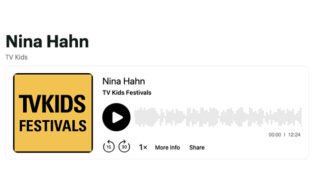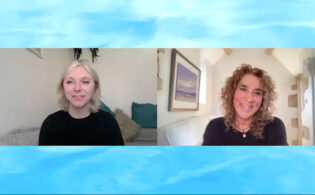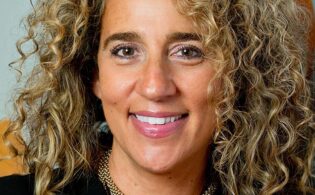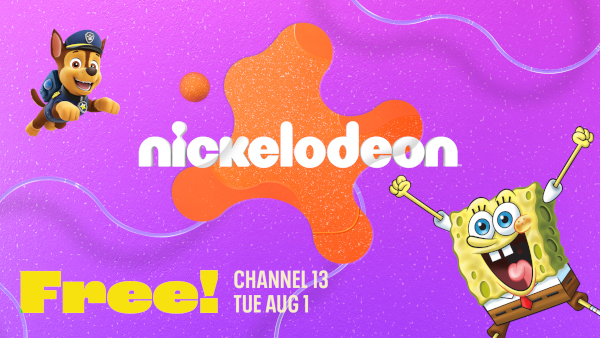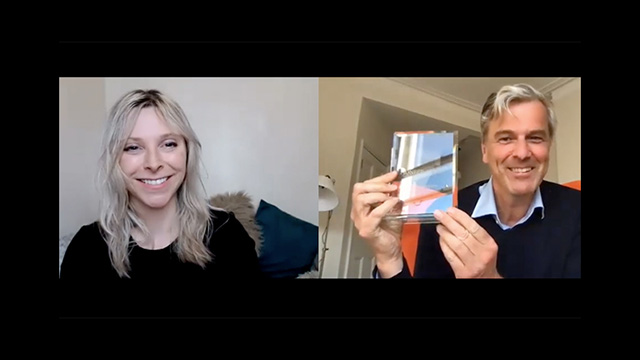Nina Hahn, the senior VP of international production and development for Nickelodeon International and head of ViacomCBS International Studios (VIS) Kids, and Jules Borkent, the executive VP for kids and family at ViacomCBS Networks International (VCNI), discussed their acquisitions, commissioning and co-production strategies as day one of the TV Kids Festival wrapped.
Borkent, as head of the international kids’ and family group at VCNI, oversees content strategy, acquisitions and content partnerships, production and development, marketing and digital.
Hahn has two hats, one at Nickelodeon International and the other at VIS Kids—a division that she described as a “platform-agnostic content Switzerland in the middle of the company that can take that expertise and produce for our owned and operated channels but also pivot and produce for anyone who is buying.”
The creation of VIS Kids was a natural evolution for the company, Borkent noted. “Nina and I have been working for the last ten years on figuring out how to best leverage the creative around the world and get content not only into the international business but also into the U.S. business. We’ve always looked at those opportunities. It started many years ago with our first foray into international production, House of Anubis. For us, VIS Kids is the next iteration of that. There is absolutely a desire to create more content around the world. While we have a fantastic pipeline coming out of our Nick domestic group, over the last couple of years, our international pipeline has grown.”
On what makes a Nick show clearly recognizable, Hahn said, “There’s a casual phrase we use internally. It’s equal parts heart, smart, fart! [That means] something to how we tell stories and depict characters in our shows. That makes kids feel at home. On the other side, there’s been a lot of attention paid to reflecting the world in which kids live. Nick really is the poster child for what it means to have entertainment spoken to you as the world of kids. We make things once and use them everywhere and create that bond with what kids around the world want to ingest.”
At VIS Kids, there’s a set of criteria for producing for ViacomCBS’s own assets and another for third parties. “The success marker is the intersection between the creative and the commercial,” Hahn said. “As we look at both of those sides of the balance sheet, we’re able to bring our expertise at making content and matchmake it with what we know the end-user (the kid) and the buyer” will need to make a show a success.
On shows that have traveled well recently, Borkent mentioned Deer Squad, which was made in China with iQIYI. “It was the first Chinese animated production we were fully on board with: we co-produced, co-financed, etc. It launched internationally in 2020 really well. It was a top performer on Nick Jr. in the U.K. It’s launched in the U.S. We also had It’s Pony, which came out of the U.K. It’s a 6 to 11 animated series and again had great success in the U.S. and internationally.”
Hahn added, “The way we’ve approached it is: What is the way to take the best stories, the best talent, the best production models and the best partners, from wherever they are, and be globally agnostic and build content that we feel like we can make once and use everywhere because it will be relevant and authentic and fun? Those shows Jules mentioned are great examples of that.” Hahn likened the approach to fusion cooking: “In the case of Deer Squad, we take talent from the Chinese market and the production company we worked with there, we used a Western writer across, we used the Asian [ViacomCBS] team. There’s been a lot of different people involved to make it ultimately holistic to a kid at home who just wants to jump into that experience and live with those characters.”
Borkent added: “The way we looked at it in the past was always, What is a global show? How can you make a show that works everywhere? If you think like that, sometimes it gets too far. We have to be a bit more relaxed about it. COVID has also shown that kids are consuming from everywhere now, whether on YouTube or other platforms. That gives us a lot of freedom to be more open and free about how we approach content. [Deer Squad] is not us making an American show in China. We made a Chinese show. That makes it more authentic.”
On how COVID-19 impacted scheduling in 2020, Borkent said, “With kids being home, we ramped up our preschool schedule with slightly more educational content. Other than that, we brought some shows back and we streamlined the schedule, so there was something for everybody. We are in preschool, we are in 6 to 9 animation, we are in live action, so there’s a lot we could offer. We’re in a good place. The network has performed really well. There was a lot more consumption. That has flattened out a bit now and things are back to more normal times, but it definitely showed us there is a huge appetite for the Nick content all over the world.”
For the creative community, working through COVID-19-related production challenges has been “an incredibly lid-lifting experience,” Hahn added. “We’ve all been allowed and asked to do things differently. We’re figuring out how to make content in a completely different way. We don’t stay in the lines any longer. As a result of that, the innovation that has come out of the way we make content, the stories we’re telling and the people with whom we’re working, has given birth to content that is astounding.”
Animation has proceeded uninterrupted, Hahn continued. “Live action has been a more interesting challenge. We did have to pause on one or two live-action productions, but in that pause point, we rewrote the back remaining scripts that had yet to be shot in order to comply with protocols we knew would be in place when we returned. When we did return, we were able to shoot seamless episodes that didn’t feel jammed into a way of shooting that wasn’t going to work. There were a lot of plusses that came out of it as well.”
Dubbing and language reversioning for animated shows once lockdowns hit was a significant challenge, Borkent added. “We had to be innovative with how we worked with voice actors and sent them kits to their homes. People were recording in their closets! While there was a bit of a hiccup over a couple of weeks, it was fascinating how quickly people just figured out new models and ways of doing that.”
Asked about lessons learned and opportunities created amid this COVID-19 period that will continue post-pandemic, Hahn said, “There are ways to get production up and running and things resourced, written, directed, recorded, scored, that we’ve never done before. I think many will continue, largely because they are super authentic. They feel more real to kids in some ways, which has been an upside. That sense of grounded storytelling and the way we make it has been a big part of it.”
This last year also saw an increased emphasis on diversity and inclusion, continuing a theme that has always been part of Nick’s DNA, Hahn said. “We’ve been figuring out ways to take that message and talk about it across the world, versus in just one particular country.”
The conversation then moved to the keys to working with talent to support the creator’s vision while also meeting the needs of the ViacomCBS platforms. “It starts with a voice and a vision,” Hahn said. “ViacomCBS in the kids’ space is the vessel for that voice and vision. We try to fill the holes in what they need. It all starts with a conversation around development. What is the show about? Why are kids going to care? We work with them across the research side, which we are very in tune with. And we help backfill the vision such that you are toggling between what the show is and the story this person wants to tell, and what we, as the kid experts, know is going to resonate. Around that is the ecosystem, including consumer products, the marketing group, programming, that is part of that lockstep with the story we’re trying to tell. It’s a Venn diagram of how all these circles fit around the [storyteller’s] vision. We are beholden to these amazing voices that want to tell a story we feel should live on at ViacomCBS.”
Carugati asked Borkent how Nick’s Declaration of Kids’ Rights, first published in 1990, continues to resonate today. He said that in May 2020, as the Black Lives Matter protests were making headlines in the U.S. and around the world, the Nick programming team convened to discuss, “How are we going to talk about this to our kids? It’s hard to explain from a global perspective. Not everything is the same in each market around the world. Somebody in the meeting said, ‘We should look at the Declaration of Kids’ Rights.’ Within a couple of days, we translated it into 25-plus languages. We ran it on all our platforms. It was really powerful. The Declaration of Kids’ Rights informs a lot of what we do. It informs the types of stories we want to tell, the types of characters we want to show. We’re figuring out now how we can keep talking about it in different formats. They are very straightforward and very clear. For us to talk like that to our audience is important and we have to continue to bring that message.”
Hahn added, “There’s a discussion happening internally about how we can take that Declaration of Kids’ Rights and make an expanded set for across the ViacomCBS family. It’s such a fantastic compass for us all to walk with.”
On Nick’s continued diversity and inclusion mandate, Hahn noted, “Reflecting the reality of the world a kid lives in today has been [important] since the inception of the channel. It has been so second nature to us. It is across all of our characters visually and graphically. It’s across how we write. It’s across the production companies with whom we work. It’s across the programming plans. There’s not a tentacle in this company that isn’t touched by the notion of how you can authentically reflect the world in which kids live. It has been a great bragging right for us. That said, we are all tasking ourselves with the question of: How can we move the needle even more? What’s the next thing we can do to improve even more?”
For 2021, Borkent said he’s looking forward to the upcoming launch of Paramount+—“it means more platforms we can bring our content to”—Kamp Koral, the SpongeBob SquarePants spin-off; and the return of Rugrats after 20 years. He also mentioned the return of Hunter Street for season four and the upcoming Goldie’s Oldies, a live-action comedy out of the U.K.
For Hahn, working on the expansion of VIS Kids is a key priority. She also highlighted The Twisted Timeline of Sammy & Raj, a co-pro with Nickelodeon India. “It’s a fusion of the best parts of storytelling between the two groups.” From Israel, meanwhile, is the live-action series Spyders, which is rolling out in Hebrew and dubbed into local languages. “Kids are now so much more global, so watching something dubbed will be an interesting barometer of their appetite for that.”
The arrival of Paramount+ provides another sandbox for VIS Kids to play in, Hahn added. “It’s great to have an SVOD service in our backyard. The way you tell stories linearly and the way you tell stories from a streaming perspective can often be the difference between one type of show and another. So creatively, we’re super excited at VIS Kids to create unique and bespoke content for Paramount+ that will be game-changing.”
 TVKIDS
TVKIDS
